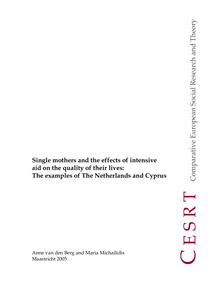This article presents results of a qualitative analysis based on biographic narratives of three young, well-educated women from Syria. They arrived in the Netherlands between 2015 and 2017 in the context of family reunion. The central question is how young Syrian women navigate between two major projects that ask for their agency, being family and work. It is argued that both occupational career development and the building of a family are ‘agentic projects’ that aim to contribute to the establishment of a new life and to regain continuity. The analyses demonstrate that both projects are closely intertwined. Agency emerges as highly relational and intersecting with the women’s position in the life course, timing of life events, ability to adapt career goals to the new situation, and impact of social contexts on family relations.
LINK
The objective of this study is to illuminate the effects of intensive aid on the self-reliance and independence of single mothers, and to show what is and what can be done to improve the empowerment of this group. Firstly the paper focuses on the effects of intensive social aid on the self-reliance and independence of single mothers, and how this affects the process of regaining social inclusion in each of the home countries. Secondly the results are compared with the second country, in respect of the socio-economic and cultural circumstances. This study is based upon a comparative data collected from randomly selected single mothers in each country. In the Netherlands information was collected during in-depth interviews; in Cyprus semi-structured interviews and questionnaires were used. The aim is to shed light on the issues that impact on the lives and the well-being of these mothers and their children in their social context. This chapter presents sections of two large research projects which attempted to investigate the single-mother families from the woman’s perspective, and it aims to analyse the following: • Factors that hinder and improve the independent life of a single mother • Choices that women make during the offered aid period and their motives • The results of this change.
DOCUMENT

This is the report on the situation in the Netherlands in the field of youth, young homeless people and unaccompanied minor aliens. The report describes risk factors for children and young people in relation to social exclusion and homelessness. This report forms the first part of the international comparative study ‘CSEYHP’. MOVISIE carries out this three-year study by order of the European Union. The cooperative partners are three universities in: England, the Czech Republic and Portugal. The objectives of ‘Combating Youth Homelessness’ are as follows: 1. to understand the life trajectories of different homeless youth populations in different national contexts; 2. to develop the concepts of risk and social exclusion in relation to the experience of young homeless people and to the reinsertion process; 3. to test how different methods of working contribute to the reinsertion process for young people; 4. to investigate the roles of and relationships between the young person, trusted adults, lead professionals, peer mentors and family members in the delivery of these programmes across all four countries. When preparing the national reports, the three partner countries the Czech Republic, England and Portugal use the same format as used in the Dutch report. Based on the four national reports, England will prepare a comparative report, in which the four national situations will be compared.
DOCUMENT
